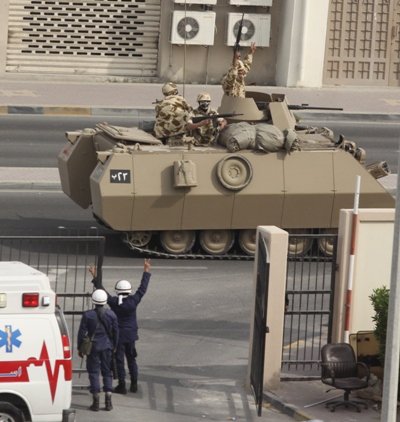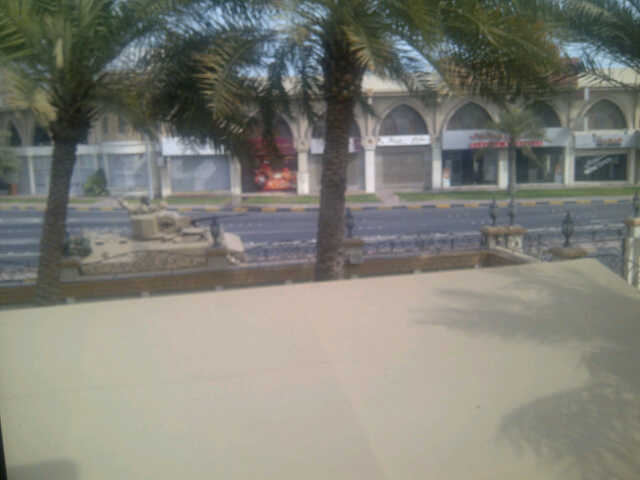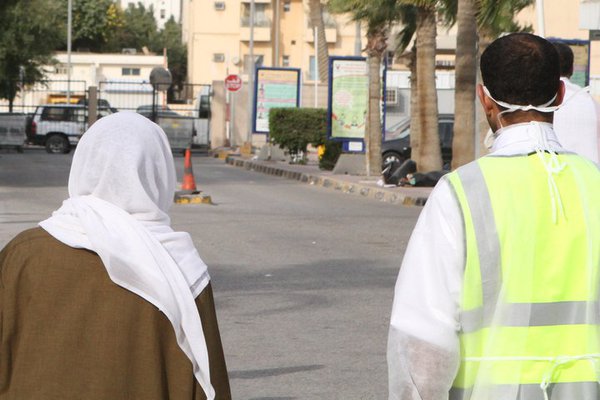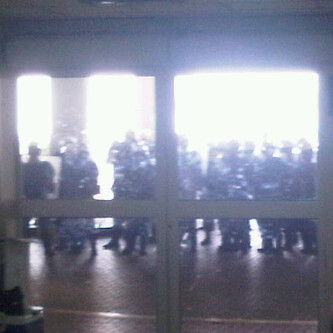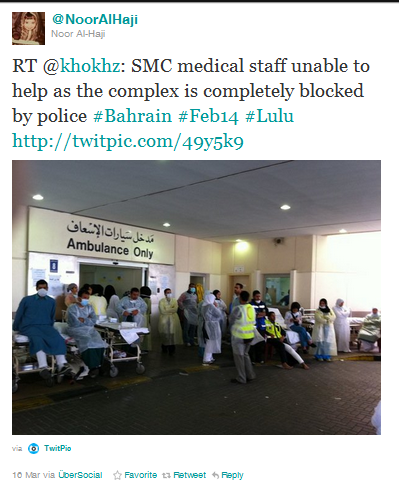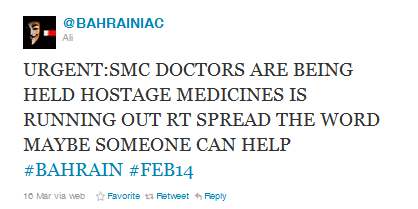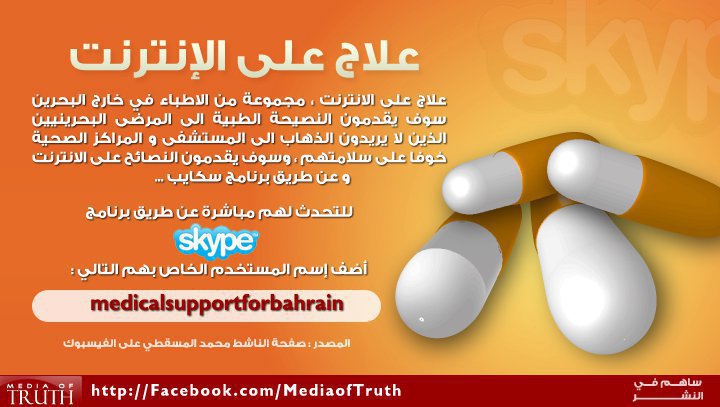2011-05-04 Doctors and Nurses on Trial in #Bahrain
WEDNESDAY, May 4, 2011
In an attempt to exterminate any form of opposition, Bahrain's two-century-old monarchy has targeting every segment of the population that showed or may have shown sympathy to the pro-democracy movement that hit the small gulf island in February.
From protesters, lawyers, teachers, and human right workers, to opposition leaders, bloggers, journalists, and medical staff. No one has escaped the regime's crackdown.
The regime has tortured, killed, and pronounced death sentences for four detainees. The four detainees had apparently 'confessed' the murder of 2 policemen under torture - torture that led to the death of one of them during custody.
During the protests in Manama, people were shot at with pellets, tear gas, nerve gas, and live ammunitions. Many of them sough medical care at Salmaniya Medical Center (SMC).
Hearing that wounded protesters were seeking medical assistance at SMC, security forces sieged the hospital, thus preventing anyone or anything from coming in or out, including ambulances.
Army tank surrounding the center 15/03/2011
Army tank surrounding the center 15/03/2011
Riot police surrounding the center 16/03/2011
Police surrounding the SMC 16/03/2011
Preventing patients to enter the hospital
For 3 days nurses and doctors were not allowed to leave the hospital.
However Al Jazeera correspondent, present at the time, managed to obtain these testimonies:
Ghassan Daif and Ali Al Akri, the doctors providing the testimonies, were arrested shortly after.
Events in the SMC provoked shock within a country that was already divided, but even supporters of the regime started to question what was happening at the hospital.
The regime then decided to spin events at the hospital, by producing reports of its own showing that everything was proceeding normally.
Despite their efforts to stifle the truth, it was clear not only that the hospital was under siege, preventing the wounded to get treatment, but also that the situation was hectic.
The Army was in control of the center and people started to warn each other to look after their cars as security forces were gathering around the trunks, presumably to hide weapons.
Hospitals were no longer safe. People, therefore, started to treat themselves at home, fearing arrest. Free medical advices was offered through Skype.
Yesterday, we learned the monarchy will place 23 doctors and 24 nurses on trial.
Bahrain's Ministry of Justice is charging them with the following:
- The inexcusable refrain from aiding people.
- The embezzlement of public funds.
- Physical assault on civilians.
- Assault leading to death.
- The possession of unlicensed weapons and ammunition.
- Refraining from carrying out their employment duties, in aims of hindering medical work, consequently endangering people’s health and lives.
- The attempt of forcefully occupying a public building.
- Promotion to bring down and change the regime by illegal means.
- Inciting hatred against the governing regime.
- Promoting sectarian hate.
- Spreading false news and rumors that harm public interest.
- Participating in unlicensed protests and rallies.
TUESDAY, MAY 3, 2011
[UPDATE]
As the world is celebrating Press Freedom Day, Al Wasat newspaper which was seen as the country's only opposition publication before it was forced to reshuffle its board, decided to close next week, following major revenue losses.
In the meantime king Hamad stressed yesterday that press freedom will always be at the center of royal reforms project.
Al Wasat is the second opposition paper to end its activities after the closure last year of Al Waqt.
This year Bahrain is ranked 119 out of 178 in the worldwide index of press freedom.
In its statement reporters without borders underlines the media blackout but also the regime propaganda that led to smear campaigns.
Read reporters without borders statement about media blackout in Bahrain
Karim Fakhrawi, founder and board member of Al-Wasat, died in custody the 15th of April 2011.
[Shia villages raided, authorities arrest 2 former members of Parliament]
As the International Automobile Federation gave a one month extension to Bahrain to decide if the Formula One Race could be rescheduled this year, the kingdom of Bahrain intensified its crackdown on its people.
Saturday a police raid on Sitra led to the death of a 6 year old boy in the village of Sitra.
Since the beginning of pro-democratic protests, violent police raids on villages have been part of the king Hamad policy to prevent sectarian conflict and economic crisis as the king put it on a televised speech shortly after the protests, back in February.
Karzakan, Sitra and Sanabis are among the last villages raided by riot police, all of them being Shiite villages.
Destroying cars, hovering the villages with helicopters (see #chopperguy on twitter), firing tear gas and what seems to be nerve gas to homes, arresting opposition leaders as well as human right workers, doctors, lawyers and teachers (see here for the full list of people detained), Bahrain’s government will to suppress any form of criticism led Saturday to the death of Mohammad Abdul-Hussain Farhan, 6, after being exposed to tear gas, following the police raid on Sitra an almost all Shiite island.
Mohammad is said to be the cousin of Ahmed Farhan [EXTREMELY GRAPHIC], which head was blown up during a demo by a helicopter fire.
SUNDAY, MAY 1, 2011
- Numerous reports of Shia mosques and matams (places of worship) being destroyed or vandalized.
Since the beginning of April, reports have surfaced of Shia mosques and matams being destroyed or vandalized.
This Facebook album contains pictures of what is said to be destroyed Shia holy places in Manama, Bahrain.
Videos have also been posted on YouTube to document the destruction, but are often taken down as soon as they are published, abusively reported as spam. Here is one such example of a video that has been removed.
Shia have, therefore, gone about documenting the destruction using other means. Chan’ad (@chanadbh), who blogs about Bahrain, has started to gather information about this growing phenomenon on a Google Map.
View Demolished mosques in Bahrain in a larger mapSo far, this non-exhaustive map lists 25 destroyed or vandalized mosques.
The Bahrain Center for Human Rights launched a campaign via Maryam Alkhawaja, to ask people to send them as much info as they could.
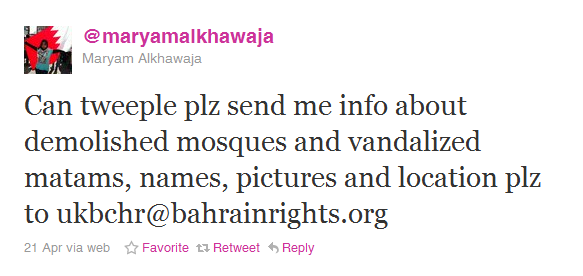
The government has not tried to deny the allegations. Instead it has responded to the issue by stating that these places had no building authorizations.
The licensing law in Bahrain was created in 1977 and mosques or matams built prior to this law can't be considered illegal due to the principle of irretroactivity.
Furthermore, some official documents started to leak through the web, showing clear evidences that at least nine destroyed mosques were registered and authorized.
Some of these documents were publicly available on the Jaffary Waqf Directorate website, in charge of registering such buildings. The website has been blocked by bahraini authorities since then.
Other Resources:
- Bahrain Center for Human Rights
- Facebook Profile: 14th February 2011 Revolution Day in Bahrain
- Global Voices Special Coverage of Bahrain Protests
- Arab Revolution
- Wikipedia: 2011 Bahraini Protests
- Wikipedia: 1990s Uprising in Bahrain
- Bahrain Constitution Online
See April, March 1 through 21, March 22 through 31, and February for previous WL Central coverage.
